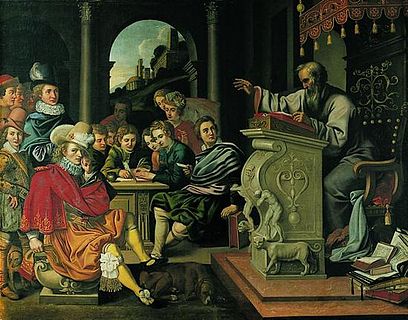Historical Rhetorics
| This book contains highly nested pages and/or nesting with inappropriate navigation. Please adjust the layout and navigation in order to improve accessibility. For help, see Manual of Style#Nesting. |

This wikibook project began in the Fall of 2009, as part of a course in Historical Rhetorics at the University of South Florida that centers on exploring the various and conflicting definitions of rhetoric throughout classical and modern history. The course will be offered again in the Fall of 2011, and this project will receive some much needed attention. Over the course of the semester, we hope to expand upon the lecture notes already here, create individual pages for relevant secondary sources, and add more sources to the project. This page should maintain a neutral point of view (in accordance with Wikibooks' core policy).
The dominant definition of rhetoric stems from Aristotle: "let rhetoric be an ability, in each case, to see the available means of persuasion." While the idea of persuasion has a powerful place in the history of rhetoric, it differs significantly from sophism and the Roman, and Christian conceptions of rhetoric. Thus, this course will attempt to place the definition of "persuasion" alongside other conceptualizations of rhetoric's purpose. Further, the course's concluding examinations of Ramus, Petrarch, Blair, Campbell, and Whatley will address how and why critical appreciation for epistemic rhetoric sharply declines as the Enlightenment and Italian Humanism rise.
Graduate students participating in the Fall 2011 course will be required to compile annotated bibliographies on important secondary articles. Those annotations will be transformed into pages for this wiki. My long term goal is to make this a sustainable resource for other graduate and undergraduate courses covering the history of rhetoric. Please forgive any omissions in the secondary sources listed below. For the first semester running this project, I have chosen to emphasize journal articles instead of either complete books or chapters in anthologies. Feel free to add articles to pages as suggestions for future research.
As the semester rolls on, I hope that students will come back to this page and create links to their brief summaries of significant articles (and "hope" should be heard in that professorial tone of "I hope they also will consider handing in their final paper and attending every class session").
- Plato's Battle Against an Oral World
- Plato's Relationship to Rhetoric
- The Big Aristotle
- A Little Aristotle and the Other Socrates
- Sophists Old and New
- Contemporary Sophistic Scholarship
- Cicero's Public and the Greek Tradition
- Should We Read Quintilian?
- Rhetoric's Medieval Resurgence
- The Death of Rhetorics of Substance
- Rhetoric During the Birth of the Modern University
